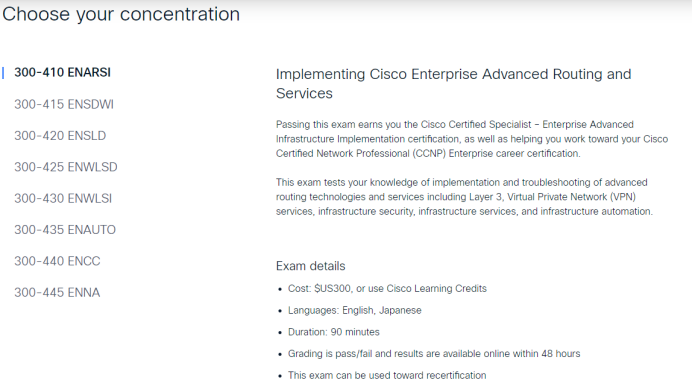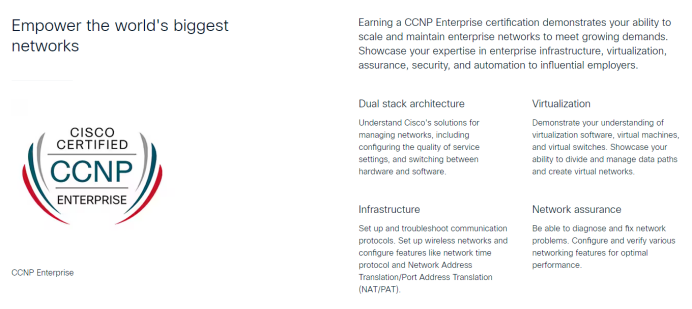Many people ask: “If I want to enter the networking field, is it worth getting the Cisco CCNP? What level of certification is it really?”

As an experienced network engineer, I’ll break down the core positioning, exam structure, focus areas, and preparation strategies for CCNP — so you’ll understand what problems CCNP can help you solve.
Core Definition: What is CCNP?
CCNP, or Cisco Certified Network Professional, is an intermediate-level certification in the Cisco certification system.
It validates your enterprise-level networking implementation and troubleshooting skills.
In short: holding a CCNP proves you can independently design, deploy, and troubleshoot small to medium-sized enterprise networks. It sits between the entry-level CCNA and the expert-level CCIE, making it the must-have stepping stone for many network engineers advancing their careers.
Where CCNP Fits in Cisco’s Certification Path
Cisco certifications are structured in three tiers:
CCNA (Associate) → CCNP (Professional) → CCIE (Expert)
Deeper than CCNA – While CCNA covers only basic concepts and simple configurations, CCNP dives into real enterprise networking skills such as complex LAN/WAN design, routing optimization, and foundational security.
Easier than CCIE – CCIE requires deep architectural design and advanced troubleshooting, with high difficulty and long preparation. CCNP, on the other hand, emphasizes practical implementation skills that map directly to job requirements, making it more accessible within a 3–6 month preparation window.
In simple terms, CCNP is the bridge from entry-level operations to advanced engineering.
What Does CCNP Cover? (Exam Structure & Content)
1. Exam Structure: One Core + One Concentration
The CCNP requires you to pass two exams:
Core Exam – Mandatory for each track. Example: Enterprise Core (350-401 ENCOR), Security Core (350-701 SCOR).

Concentration Exam – You choose from several options depending on your career path. For example:
Enterprise: SD-WAN, Wireless Design, Automation
Security: Firewalls, IPS, VPNs
This flexible structure means you can tailor your certification to your career goals.

2. Core Exam Focus: Practical Skills, Not Just Commands
Across all tracks, CCNP emphasizes real-world problem-solving rather than rote memorization. Main areas include:
Network Deployment & Configuration – e.g., building enterprise LANs with OSPF/EIGRP, setting up VPNs, deploying firewall policies.
Troubleshooting & Optimization – diagnosing connectivity issues via logs/packet captures, analyzing bandwidth usage, applying QoS.
Technology Principles & Design Choices – understanding when to use OSPF vs. BGP, or how to design scalable security architectures.
CCNP tests “Can you get the job done?” instead of just “Do you know the theory?”.

3 Practical Tips for Preparing for CCNP
1. Build Your Foundation First
While Cisco doesn’t require CCNA before CCNP, the exams assume you know CCNA-level basics (IP addressing, routing protocols, TCP/UDP ports, etc.). Skipping CCNA can make CCNP much harder. If you lack this background, review CCNA knowledge first.
2. Don’t Just Memorize — Use Dumps
The CCNP exams include many scenario-based, practical questions (e.g., troubleshooting branch-office connectivity, optimizing wireless roaming).
Simply watching videos or cramming theory isn’t enough.
Using a comprehensive CCNP dumps is one of the most effective prep strategies:
You’ll get familiar with actual exam-style problems.
You’ll sharpen troubleshooting logic through repeated practice.
You’ll reduce surprises on test day.
We’ve built a dedicated CCNP exam dumps covering both core and concentration exams, helping candidates focus on high-frequency topics and master real-world scenarios efficiently.
3. Choose the Right Track for Your Career
Enterprise Infrastructure – best for general network engineers, widely demanded.
Security – rapidly growing field, often higher salaries.
Data Center – popular in large enterprises, but requires more advanced background.
Before choosing, check job postings in your target industry to see which track is most valued.
Final Thoughts
The Cisco CCNP is not a “magic key,” but it’s a highly cost-effective certification for network engineers.
Compared with CCNA, it adds much more technical depth.
Compared with CCIE, it’s faster and more achievable.
Most importantly: focus not only on passing the exam but on mastering practical skills.With the right dumps practice, you’ll build the confidence and competence that employers value most — and the certificate will simply be proof of that capability.
I'm your man who have the 100% valid dumps , buy it now for 50% off to clear your exam!
Click it ↓↓



